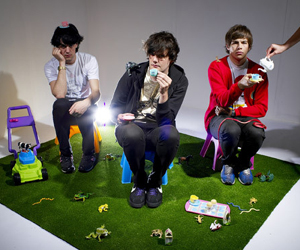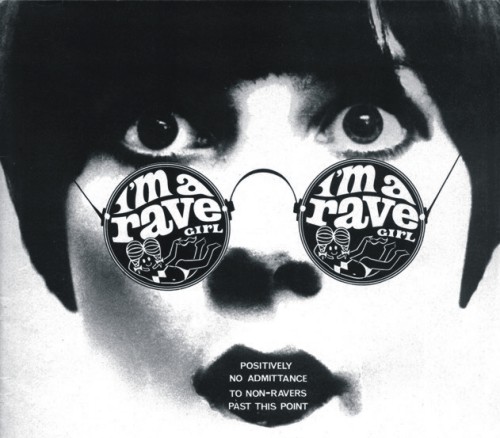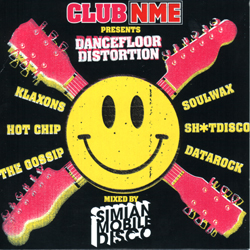
|
Riding the Mayflower - On a cold December night in 1992, at the edge of a sheer cliff on Scotland's east coast, two men, James Caulty and William Drummond, pushed a rusting Nissan Bluebird into the sea. It was a sacrifice, a bolt of metal myth making intended to guarantee that neither Caulty nor Drummond would try to discuss, or profit from, their stadium house band The KLF for a period of twenty three years.
Caulty and Drummond surfaced again in 1994. They'd deleted The KLF's catalogue and had cashed its royalties. Setting up on the island of Jura, they made a bonfire and fed it with bundles of fifties. Although it was supposedly a piece of installation art, Caulty and Drummond acted like disgraced politicians, desperately burning evidence. A last frenzy of consumption, a million quid going up in smoke, to confirm what everyone with a fully functioning brain had hoped for. Rave was Dead. No one paid any attention to Caulty and Drummond - both now living as syphilis riddled recluses. The decadence that swallowed the first half of the nineties is leaking back in to our lives. I have seen a pale horse, and the name of him that rode on it was The Klaxons. " I really love Klaxons, they're gonna be making five albums and getting better and better. The lyrics are great- they're all about Greek mythology, so he's obviously well-read " Nicky Wire They may be well read but Nicky Wire really should know better.
There's a misconception that the most diabolical of Margaret Thatcher's political crimes were carried out in the early eighties. Stripping communities of their livelihoods; synchronizing a war with an election; an open attempt to disenfranchise Britain's poorest citizens. Although high profile, all of these atrocities were collaborative endeavours, invested with the twisted ingenuity of a whole cabinet of corrupt whoremongers. No, the truly wicked stuff- the lies and violence that were solely the product of Maggie's mind- came later, around the time that people started using "rave" as a noun. Confronted by an increasingly punitive and monotonous labour environment, the only response anyone could think of was to reconstruct that environment in clubs and on turntables. The depressive vortex that arrives after prolonged contact with E mimics the depressive vortex that will greet most of us on Tuesday mornings for most of our lives - the knowledge that the next eight hours will be spent performing incomprehensible tasks in the company of boring, incomprehensible people. Swap the hum of the air conditioning for the thud of a bassline and no one would know the difference. This is new rave. stitched together from piping synths, lo-fi drum programming, shrill lyrics and off kilter power chords. The Klaxons, The Sunshine Underground, ShitDisco - they're all part of a process of mechanical reclamation. The bones and gristle and sinew of ten bland years are rendered and whisked to produce something empty, flavourless and ignorant. A fluorescent void, unable to provoke thought or reaction. Simon Taylor Davis may be trying to base his band around a critique, and the critics of, post war futurism - but in songs like "Myths of the near future"(J G Ballard), the baleful first single "Atlantis to Interzone" (William Burroughs) the Klaxans fail to point to anything worthwhile. Instead they demonstrate an inability to identify with the works that they reference. New rave and old rave see pleasure as an end in itself, as a resource to be traded. Burroughs had his junk, Ballard grew up in colonial Shanghai, watching the wives of civil servants drown in leisure and gin. But hedonism was never at the core of their work, or their politics. Blame it all on Thatcher and ecstasy. "There is an intention in losing consciousness in order to do away with the formidable world in which consciousness is engaged... Therefore we have to do with magical behaviour provoking the symbolic satisfactions of our desires..." Jean Paul Sartre, Freedom
New rave, although lacking a narcotic subculture, sits at the top of a ziggurat of E. Thatcher had put everything else up for sale, so why not add human emotions to the pile? E gave easy access to a sense of contentment and unfettered pleasure. E gave you a taste for ready-made egalitarian well-being. The dealers provided the distribution network and old rave gave you a context that legitimised your blind pursuit of hedonism. Peace reigned on dance floors throughout lady Thatcher's kingdom. And you grinned and tried to hug the SPG, even as they were kicking seven unique shades of shit out of your best friend. A medicated society is easier to control. Accessing and participating in certain social states is a skill, a skill that's being forgotten. Political expedience dictates that it is easier to let the richer and more complicated human emotions slip in to obsolescence than it is to ban them outright. E sets predictable limits on pleasure, it lets the savy consumer slip a half hour high into a busy schedule of shopping and boring conversations. The pleasure seeker no longer has to practice restraint or critically assess their desires. E is the only drug that comes with an itinerary. The consensus E experience is so strong that everyone knows what they're getting ahead of time. There doesn't even have to be any active ingredient involved; provide a suitable musical backdrop and the placebo affect will do the rest. There's a reason why New Labour chose D:ream's flaccid, sanitized impersonation of the Madchester scene as their official soundtrack. It was a lullaby for the voting public, an attempt to induce mass euphoria. They needn't have bothered, but that's a story for another time. The pills were only ever a unit of commerce. New rave proves that Caulty and Drummond didn't succeed when they tried to purge the hedonistic impulse at the foot of those Atlantic cliffs. It's no longer necessary to turn to drugs in order to access a state of dumb emotional materialism, all you need are a few grimy guitar chords.
There is an alternative. New rave doesn't need to be cured; it doesn't need to be fought. What's required is a different approach to gratification, a new way to perceive pleasure. We'll work for our victories. We'll shatter bones in the pursuit of that happy, post-gig haze. "I don't know Johnny Rotten, but I'm sure that he puts as much blood and sweat into what he does as Sigmund Freud did." Mogwai Punk was the consequence of a single moment of clarity, a decade's worth of cynicism revealed in its entirety. Punk rock incorporates the aftermath into the performance. A holiday in someone else's misery - a leisurely stroll through an annihilated landscape. This should be our reference point when we try to understand pleasure for what it really is. The hedonists see pleasure as an end in itself. Punk knows that pleasure is something only found in the wreckage that follows the final song in a set. Pleasure is embers and a massive repair bill. Pleasure is consequence, not cause. Aren't we here to tear down the normative foundations, the great projects that insisted that the future of the human race lay inside tower blocks and on grey, thundering overpasses? There's nothing more terrifying than seeing restrained, rational people inspired to anger by a simple act of observation. There's nothing more human or triumphant, either. We're standing on the deck of the Mayflower, watching new rave's luminous lies fade into a grey horizon and then... vanish. Sounds: Cibo Matto - Birthday Cake, Artichoke Hearts
Jean Paul Sartre: Freedom in Stephen Priest
*Like punk, puritanism was a term used to describe a descenting ideology by a disapproving public consensus. That same consensus couldn't understand that artificial categories contained more information about the groups using them than the groups they were applied to. The punks and the puritans became heretics when they declared that emotional states were governed by a causal mechanism.
|



